]]>
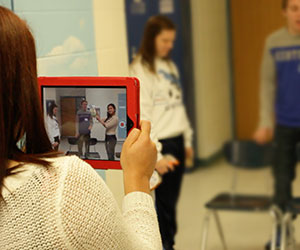 When we started BenchFly five years ago, in 2009, our mission was to make research a better career for current and future generations of scientists. Today we continue to work toward this goal using video as the primary means to educate scientists in companies, in universities and now in high schools! In the fall of 2013, we were incredibly fortunate to have met Kentucky teacher Tricia Shelton (thank you, Twitter!) arguably one of the most energetic, passionate, and dedicated teachers out there. In less than 12 months, our collaboration has resulted in a new video-based curriculum, called The ART of Video
When we started BenchFly five years ago, in 2009, our mission was to make research a better career for current and future generations of scientists. Today we continue to work toward this goal using video as the primary means to educate scientists in companies, in universities and now in high schools! In the fall of 2013, we were incredibly fortunate to have met Kentucky teacher Tricia Shelton (thank you, Twitter!) arguably one of the most energetic, passionate, and dedicated teachers out there. In less than 12 months, our collaboration has resulted in a new video-based curriculum, called The ART of Video , and a Gates Foundation grant supporting further assessment of the program’s potential in the classroom. Thanks to Tricia, we’re engaging with and developing those future scientists we’ve been thinking about since 2009.
, and a Gates Foundation grant supporting further assessment of the program’s potential in the classroom. Thanks to Tricia, we’re engaging with and developing those future scientists we’ve been thinking about since 2009.
But this is not about the ART of Video (this link will tell you more and show Tricia’s students in action). It’s about the human side–how the boundless energy of collaborators like Tricia and her students can fuel a project long before the funding arrives to support it. It’s about honoring the educators working day in and day out to create environments where future scientists can thrive. It’s about being grateful for organizations like The Gates Foundation who see a spark and are willing to fan the flames to see how brightly it can burn.
And finally, it’s about thanking the students and watching in amazement. At BenchFly, we never cease to be blown away by the quality of videos a high school student can produce with an iPad. Trust us when we say video is here to stay and the future of science looks bright.
As a new school year gets underway, we fire up the ART of Video with a fresh crop of students. Throughout the coming semester and year, we will track the progress of the Shelton class here on our blog and highlight some of the incredible video products they’re creating–so stay tuned.
To show your support for the Shelton Class, follow Tricia on Twitter and tell her thanks!
For more information about The Fund for Transforming Education in Kentucky, visit: https://www.thefundky.org/
]]>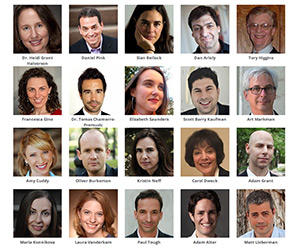 Anyone who has worked in a lab for more than a month understands that with the great excitement of research also comes frustration. This is part of the process of working at the forefront of knowledge–some ideas are going to work and some aren’t. As scientists, our job is to make advances in our understanding of the world around us and that doesn’t always come easily. However, we understand (first hand!) the toll that failed experiments can have on our attitude, motivation, and general outlook on career prospects. But if “understanding our experiments” is a matter of science, then how is “understanding our success” any different? Glad you asked…
Anyone who has worked in a lab for more than a month understands that with the great excitement of research also comes frustration. This is part of the process of working at the forefront of knowledge–some ideas are going to work and some aren’t. As scientists, our job is to make advances in our understanding of the world around us and that doesn’t always come easily. However, we understand (first hand!) the toll that failed experiments can have on our attitude, motivation, and general outlook on career prospects. But if “understanding our experiments” is a matter of science, then how is “understanding our success” any different? Glad you asked…As weeks in the lab turn into months, and months into years, it’s not uncommon for us to narrow our blinders–focusing exclusively on our one area of expertise and our one career goal. The downside of intense, prolonged hyperfocus is that when we do finally pause to look around we may not recognize (or like) the place in life where we find ourselves. We’re not calling for a lack of focus, but rather an occasional perspective check: what are we doing, are we still happy with where we’re headed, are there opportunities that we’d like to pursue that we’re missing?
In other words: Am I still “thriving” in my current situation?
If this question gives you pause (“I’d never use the word ‘thrive’ to describe my project in lab…”), then take note. Why shouldn’t you be thriving–not just in the lab, but personally? If I’m not “thriving”, am I in trouble? Is there any way to regain control of my drive, success, and ultimately happiness?
Yes! Dr. Heidi Halvorson, Director of the Columbia University Motivational Science Center, has organized a FREE online conference this week that brings together over 20 scientists and experts to discuss The Science of Thriving. The conference addresses proven beliefs and strategies for success based on rigorously tested science-based advice. Many of the speakers will be recognizable for their previous TED talks. How is that not worth a few hours of our time each evening this week?!
While the conference is not explicitly directed toward the success of “life scientists in the laboratory”, the principles are generally applicable. If we can’t figure out how to apply talks like “Nine Things Successful People Do Differently“, “Choke: The Secret to Performing Under Pressure“, or “Sidetracked: Why Our Decisions Get Derailed and How We Can Stick to the Plan” to our life in the lab, then maybe we’ve got bigger problems…
So every evening this week while you’re waiting for that reaction to complete or that gel to finish running, take a few minutes for yourself and attend the conference. What have you got to lose?
Click here to register (only an email address required):
http://www.entheos.com/The-Science-of-Thriving
.
Disclaimer: We have no vested interest (other than wanting you to succeed!) in whether or not you attend this conference. We are sharing it simply because it looks interesting and we thought it would be worthwhile to attend.
]]> We recently reconnected with our friend, Eva Amsen Ph.D., and found that in the time since our last conversation she’s moved on to a new job (congrats!). Her new position at Faculty of 1000 has thrown her right in the middle of a topic many scientists are very interested in–the future of scientific publishing. In a world of ever-increasing numbers of journals and lower technological barriers to information sharing, it’s unclear whether most publications will survive. We recently spoke with Eva about her views on the future and how the fear of getting scooped may be a driver for a new model of publication.
We recently reconnected with our friend, Eva Amsen Ph.D., and found that in the time since our last conversation she’s moved on to a new job (congrats!). Her new position at Faculty of 1000 has thrown her right in the middle of a topic many scientists are very interested in–the future of scientific publishing. In a world of ever-increasing numbers of journals and lower technological barriers to information sharing, it’s unclear whether most publications will survive. We recently spoke with Eva about her views on the future and how the fear of getting scooped may be a driver for a new model of publication.
1. BenchFly: Since we last collaborated to create a Group Meeting Bingo board for Developmental Biologists, there have been some exciting changes in your life!
Amsen: Yes! I had fun setting up the Node and providing an online space for developmental biologists, but I wanted to work with a broader group of scientists – beyond developmental biology and stem cells – so I moved to F1000Research, where I get to work on a journal that’s doing interesting things for all life scientists.
2. Based upon your recent experience, do you have any advice for other scientists on finding opportunities away from the bench?
If you’re at the bench now, and know that you want to find a job outside of research, start doing some of that work on the side right now. I know lab work is time consuming, but if that’s all you do, then that’s going to be all that you *can* do. I did a lot of blogging and science writing on the site, which proved useful, but other people might be interested in public engagement activities, or editing papers for friends, or even starting up a company on the side. If you really want to do these things, it will be fun to you, and you can find time for it.
3. Many folks looking to leave the bench worry that their years of scientific training will essentially be lost when they walk out of the lab. What skills, if any, do you feel prepared you well for your new position? Conversely, what have you found to be challenging?
The main translational skills that I picked up in the lab are probably time management and project planning. If you’re dealing with live cells that need attention every 48 hours, and thesis deadlines, and papers to grade, you get very good at determining what needs to be done to get everything finished on time!
The most difficult thing for me after leaving the lab has been that I don’t always enough time to think and process. I think I miss incubation times, where an experiment is just running itself for an hour or so and you can do something else without delaying your work. Now, if I sit and think for an hour, I’m an hour behind on my work!
4. We theorized that at some point in the not-too-distant-future, journals will no longer be the primary mode of scientific publication and over 70% of scientists thought that would be in the next 20 years. However, there are a number of innovative new publication models emerging. How do you see the future of scientific publishing?
I can see journals disappearing slowly. Journals come from a time when periodical print publishing was the best way to get your work out there, and that has now become a slow and static process compared to the much more flexible internet. There are entire fields within physics where researchers don’t publish in journals anymore, but just upload their work to ArXiv. In the life sciences we’ve been more conservative, but here, too, people are starting to publish a lot of their work outside of journals. Figshare and institutional repositories are getting large amounts of data that might not otherwise be published anywhere, but now is out there, ready for others to see. That just wasn’t possible in the 17th century, when the first scientific journal was published. Many new journals take full advantage of the fact that they don’t have to deal with print issues: they can accept all sound science, link and embed material within the text, track article level metrics, publish non-static articles, include referee reports and accept comments. Journals are starting to look less like journals, and more like interactive websites, so I can see that we’re in a transition phase, where eventually “journals” with periodical issues will become redundant.
5. Beyond the emergence of alternate platforms for sharing results (lab website/blog, etc.) the last decade has seen an explosion in the number of journals. F1000 has also launched a journal, F1000Research – what made F1000 decide to jump into the publication arena and what makes this journal different from the hundreds of other publications out there?
Technically, the company has previous publishing experience: F1000’s founder, Vitek Tracz, also founded BioMedCentral, the very first open access journal. F1000Research is effectively the next step: first it was open access, now it’s open data and open refereeing.
The biggest difference is that F1000Research does transparent post-publication peer review: articles go online after an in-house check, and the peer review doesn’t start until after the article is published. On any given article you can see if it has been reviewed yet, if authors have revised it, and even the full referee reports by invited reviewers – and their names! By publishing before review, research can get out there much faster.
Another difference is that authors can always update their paper – not just in response to reviewer comments, but also if they did some more experiments that they’d like to add to support the paper, or to update a literature review with a summary of new work. Those newer versions of the paper are linked to the old one, so you can always find the latest updates.
6. Speed is definitely important–anyone who’s ever worked in a lab is familiar with the idea of getting “scooped”—or seeing their work published by another group before they publish theirs. In fact, as a graduate student I had a paper held up for nearly at a single journal—not exactly relaxing times. Was this the major driving force for establishing the journal?
It was one of the main driving forces. (Openness — of data and referee reports as well as the paper itself — was probably the biggest one). The fact that we can publish an article within days of submission has definitely been a driving force for some of the authors who submitted to F1000Research. If you know a competitor is working on the same thing, it can be extremely stressful and disappointing to then get scooped as a result of delays by editors and referees. With F1000Research you might still have to wait for the referees (and articles don’t get indexed in PubMed until after they pass peer review), but in the mean time, the work is out there, and you can prove that you did it first. It’s also really useful if you have a grant deadline coming up: you don’t have to say “manuscript submitted” or “under review”, but you can link to the actual paper.
7. We live in a short attention span society, where thoughts longer than 140 characters seem burdensome… So if you were walking past a scientist in a hallway and had to blurt out one sentence as to why they should consider publishing in F1000Research, what would you say?
If we were running quickly and I had *very* little time to talk, I would steal the title of a blog post that Jeffrey Marlow at Wired science used to write about F1000Research: “Publish first, ask questions later”
If I had a bit more time, and could use a full 140 characters, twitter-style, I’d say “F1000Research uses a transparent post-publication peer review system, so you can publish within a week, and see signed referee reports later” (That’s exactly 140, although without punctuation…)
8. Since we’re still sweating over the stressful memories question 7 elicited, we want to open the final question up to everyone since we’re curious how many people share our anxiety (or if we’re just neurotic…).
Note: There is a poll embedded within this post, please visit the site to participate in this post's poll.
Eva holds a PhD in Biochemistry from the University of Toronto, and is interested in all aspects of communication between researchers, from hallway conversations to academic papers. Before joining F1000Research, she launched and ran several initiatives for scientists to connect with each other and the wider community, such as the Node and SciBarCamp.
Leading image courtesy of F1000 Research.
]]>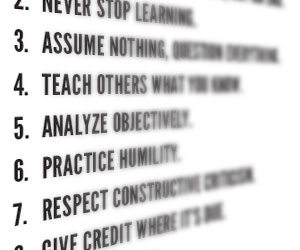 We’re three weeks into the new year. By now, most of us have decided that the “all organic raw nuts and berries” diet we were so gung ho about probably isn’t going to make it into February. Nor is the six-days-a-week workout schedule we undertook on January 2nd, after the hangover wore off. For now, three days a week will do. By March, we won’t even remember which gym we signed up with. Reflecting upon the over-optimistic personal goals we set for ourselves every January, we pondered whether their were rules of a scientist’s life that we should adhere to at all times, regardless of the month.
We’re three weeks into the new year. By now, most of us have decided that the “all organic raw nuts and berries” diet we were so gung ho about probably isn’t going to make it into February. Nor is the six-days-a-week workout schedule we undertook on January 2nd, after the hangover wore off. For now, three days a week will do. By March, we won’t even remember which gym we signed up with. Reflecting upon the over-optimistic personal goals we set for ourselves every January, we pondered whether their were rules of a scientist’s life that we should adhere to at all times, regardless of the month.
.
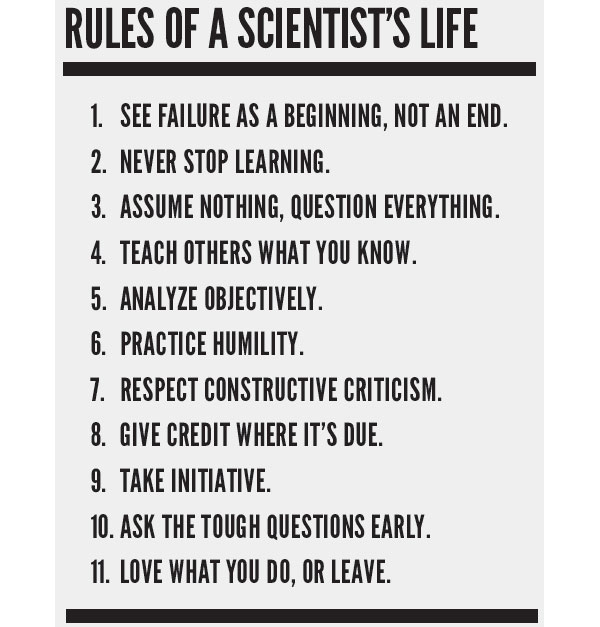 [click here or on image to download a PDF version]
[click here or on image to download a PDF version]
.
Have any other rules you’d like to add to the list?
.
]]> As 2012 winds down and people start hiding their pipetman stash in anticipation of heading home for the holidays, we wanted to take a minute to reflect on the year and say thanks to those who helped make it a great success.
As 2012 winds down and people start hiding their pipetman stash in anticipation of heading home for the holidays, we wanted to take a minute to reflect on the year and say thanks to those who helped make it a great success.
It’s hard to believe our fourth year is in the books. Since we consider our relationship with science to be more like marriage, 2012 marks the fruit or flowers anniversary. So, science, we’ll keep our eye out for that Florida citrus basket I’m sure you’re sending…
Along the road, we’ve been very fortunate to have worked with a number of very talented contributors who have shared their expertise in everything from lab management to fashion trends. Their enthusiasm and support is inspiring and fuels our passion for helping scientists every day.
This year we welcomed new columns by Yevgeniy Grigoryev, Kristy Meyer, @27andaphd, and FlyGirl. We also saw the continuation of the popular Dear Dora, Mind the Gap, and Enzyme Corner columns by Dora Farkas, Katie Pratt, and Christopher Dieni, respectively.
Articles by Food Lab and Adrian Dunn provided tips on how to work in a delicious meal or rigorous workout without the time or money we assumed we needed. I’m sure Pfizer was excited by the workout article as well since the sales of Advil saw an unusually large bump shortly after I started the regimen. It’s normal for your quads to shake for two hours after doing simple lunges, right?
One of our favorite scientists and authors–and now TV hosts–Mark Changizi helped us understand how how music evolved to fit our brains, as he hypothesizes in his new book, Harnessed. He also shared the popular 7 requirements of all effective scientists. Fellow scientist-turned-author Katharine Sanderson revealed how she went from bench chemist to freelance science writer illustrating that with determination and guts, anyone can create the career opportunities they desire. Of course, any career these days—at the bench or otherwise—depends on a computer, so as Mauricio Prinzlau cautions, back it up. Hard drives die every day and their failure is often accompanied by a failure of bowel control as well. For the sake of your data–and your desk chair–consider an online solution.
Yuly Fuentes-Medel and Jennifer Pirri inspired us with their tale of developing an amazing training program to train the next generation of Latin American scientists. We were also fortunate to interview Tom Barton and Luis Echgoyen, both of whom sought to impact the future of science as the American Chemical Society President. Congratulations to Dr. Barton—we look forward to an exciting 2013 under his stewardship at the ACS.
And of course, thanks to You. Fellow scientist, reader, commentor, sharer, advocate. We started BenchFly in 2009 with the goal of supporting scientists in and out of the lab. Your feedback, comments, contributions, and suggestions have helped BenchFly evolve in ways we couldn’t have imagined in 2009. Tolstoy reminds us “each person’s task in life is to become an increasingly better person.” We’ve taken that to heart and have dedicated ourselves to looking forward—not just to 2013, but beyond. Not just “where is BenchFly going”, but “where is science going”? And how can we continue to fulfill our mission and best serve scientists.
This is our goal.
2013 will bring with it a number of exciting changes to both BenchFly and the profession we all love. We will work hard to earn your continued support. In the meantime, have a safe and wonderful holiday season and we’ll see you in the New Year!
— Alan
.
]]>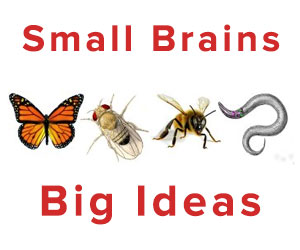 As graduate students, it can be tempting to fall into the role of “seen and not heard”, believing that our larger contribution to science will have to wait until our name has a more commanding title to it. But two entrepreneurial scientists prove that with initiative, vision and determination, changing the face of science is possible at any time.
As graduate students, it can be tempting to fall into the role of “seen and not heard”, believing that our larger contribution to science will have to wait until our name has a more commanding title to it. But two entrepreneurial scientists prove that with initiative, vision and determination, changing the face of science is possible at any time.
Today marks the kick-off of the second annual Small Brains, Big Ideas (SBBI) conference in Santiago, Chile. The brainchild of Yuly Fuentes-Medel and Jennifer Pirri, SBBI provides a crash course in invertebrate research for students across Latin America. Fuentes-Medel and Pirri recognized that–unlike vertebrate research–invertebrate models’ low-cost and easy setup make them ideal systems for blossoming scientific communities around the world. Theirs is an inspirational tale of identifying a need in an enthusiastic population of scientists and devising a program to fundamentally affect the future generation of scientists in the region.We hope their success will inspire others to pursue their dreams of impacting science in their own way. We recently sat down with the co-founders to discuss how they transformed SBBI from an idea with an overwhelming to-do list into a successful conference with an attendee wait list.
BenchFly: Clearly, you weren’t sitting around lab one day saying to yourself “I need more work”… So explain where the idea for Small Brains, Big Ideas came from and what compelled you to actually takes steps to make it happen?
Yuly: I was educated in Latin America with very few resources but an overwhelming abundance of good ideas. When I was doing my PhD in Worcester, MA, I realized that we were sitting on a great opportunity to make a difference. I went to a conference where I met Professor Dr. Jimena Sierralta who is now a co-organizing the course from Chile. Then we recruited Dr. John Ewer, who had recently moved to Chile and had the experience of working with model organisms in both the USA and Chile as a Principal Investigator. Also, the Neurobiology Department is a unique collaborative group of people focused on invertebrate biology who believe that using invertebrates in biomedical research is not the alternative, but the solution. I believe we can catalyze scientific progress in creative ways; Small Brains, Big Ideas was a perfect way to use my scientific mind. Of course, these projects are always a team effort and we never would have been able to move forward without the strong support of Jimena Sierralta, John Ewer, the Neurobiology department and graduate school of UMass.
Jenn: I have always been really passionate about scientific outreach and education. I think spreading the word about what we do and providing opportunities for others to grow as scientists is one of the most important way we can give back to the community. So, when Yuly came to me and asked if I wanted to help with the project, I was excited to join.
For other students, postdocs, or faculty members who are sitting on a great idea for a conference/meeting/symposium but don’t know what to do next — what are the first five steps they should take?
Step 1: Identify and match need with opportunity
Step 2: Don’t be afraid to go public. The more you talk about your idea, the more exited people get.
Step 3: Have a vision. This will get organizers, faculty and students committed to participate.
Step 4: Research potential sponsors and be creative about funding.
Step 5: Make motivating the participants the motor of your project.
Also, as a side note, you never know what a beautiful destination can do to motivate people. In our case, Chile, is a great place to share passion about science.
What were the top three challenges that you ran into that others should avoid, or at least be aware of?
- International destinations can present a challenge. It can be difficult to send biological samples and coordinate everyone’s documents for travel.
- Funding can be difficult to secure. You need to make sure you have a good plan to pitch your project and also have methods in place to handle the money once you get it.
- Communication is key. It can be difficult to coordinate so many people, so make sure you establish open lines of communication early and touch base often.
After a successful first year, how do you keep the momentum and excitement going until the next conference?
We evaluated the first conference and took the comments of participants seriously.
We have developed a website–www.smallbrains.org–to post pictures and videos of the course and we have recently started using social media sites like Twitter and Facebook to keep people updated and spread the word on the progress of the project. We are constantly recruiting people to join the project and are discussing opportunities to make things better. The key is to stay vocal about your project and the excitement will just take off.
What is your long-term vision for SBBI and what do you hope students take away from it?
Sometimes people think money is the most essential component to do good science, however without passion or exciting ideas science does not progress to investment. The most important component for doing good science is found within. We want to develop a strong global network of scientists and help produce the future leaders of science in Latin America.
Jennifer Pirri, GSBS student
Jennifer joined the Neurobiology Department of UMass Medical School as a graduate student in laboratory of Dr. Mark Alkema in 2005. Her thesis research is focused on how the nervous system produces coordinated behaviors in the nematode, C. elegans. During her time as a graduate student, Jennifer, was the recipient of the Dean’s Award for Outstanding Curriculum Achievement, and the Student Award for Outstanding Mentoring. She also became an active participant in the National Lab Day Network, providing STEM outreach education to middle and high schools in Massachusetts. She will complete her PhD thesis work in December of 2012.
Yuly Fuentes-Medel, Ph.D.
Yuly is presently doing a fellowship in economics at the Sloan School of Management at MIT studying the economics of life science innovation. She completed her Ph.D. in Biomedical Sciences at UMass Medical School in Worcester, MA and developed her thesis work in a collaboration project between Dr. Vivian Budnik and Dr. Marc Freeman within the Neurobiology Department there. Her research area focused on how glial cells contribute to the formation and growth of synapses at the Drosophila NMJ. She has a biochemistry undergraduate degree from University of Concepcion, Chile. Yuly is an active member of women entrepreneurs in science and technology (WEST). She has a passion for science, innovation and self-development.
]]>
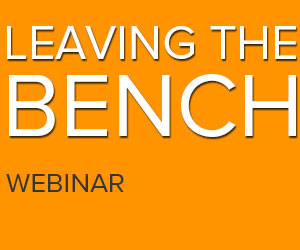 There comes a time in many researchers lives when they realize it’s time to move on. Like professional athletes struggling with the decision when to retire, researchers face a flood of emotions that can cloud decision-making and leave us unsure of what to do next. This feeling of paralysis leaves our career development in the hands of others who end up making the tough decisions for us — not a good place to be. Today in a webinar with our friends over at BioCareers, I’ll discuss how to take a page out of the entrepreneur’s playbook to take control of your career development and discover what it is you were meant to do — all from the comfort of your computer!
There comes a time in many researchers lives when they realize it’s time to move on. Like professional athletes struggling with the decision when to retire, researchers face a flood of emotions that can cloud decision-making and leave us unsure of what to do next. This feeling of paralysis leaves our career development in the hands of others who end up making the tough decisions for us — not a good place to be. Today in a webinar with our friends over at BioCareers, I’ll discuss how to take a page out of the entrepreneur’s playbook to take control of your career development and discover what it is you were meant to do — all from the comfort of your computer!
Date: Today. Wednesday, September 19, 2012
Time: 1-2pm ET
Registration: https://www2.gotomeeting.com/register/208470306
Hope to “see” you there!
UPDATE: In case you missed it, the webinar can be viewed here.
.
]]> Today we share our recent interview with Dr. Tom Barton, candidate for President of the American Chemical Society in which he discusses his most memorable moment in the lab and where he sees the future of science in America. This is a follow-up to yesterday’s interview with the other nominee, Luis Echegoyen, PhD.
Today we share our recent interview with Dr. Tom Barton, candidate for President of the American Chemical Society in which he discusses his most memorable moment in the lab and where he sees the future of science in America. This is a follow-up to yesterday’s interview with the other nominee, Luis Echegoyen, PhD.
Tom Barton at a glance
– Years in academia: 45
– Years in industry: 0
– Years in government: 0 (but 18 years as Director of a DOE national laboratory)
– Most memorable event in the lab: First synthesis of a silabenzene
– Most memorable event outside of the lab (science-related): When friends(?) hired a stripper to attend my undergraduate class of organic chemistry.
BenchFly: What do you see happening in ACS/Science/USA/World that compelled you to run for president? What’s your vision for improving the current situation?
Barton: There was no one single thing that “compelled” me to accept the invitation to stand for ACS President, other perhaps than having just retired I only now have the time to give to what I believe is properly a full-time position. I suppose if I have to pick only a single thing it would be the deplorable state of U.S. K-12 science education. I am a strong believer in significantly increasing the rigor of U.S. science education (yes, that includes longer school years!) and enhancing the quality of teaching and teachers (yes, greater selectivity and greater pay). The ACS should be a leader in an intersocietal effort in this arena. It will not be easy, but our country cannot afford for it not to happen.
We elect our nation’s president to 4-year terms to provide stability and give the leader time to implement their ideas, since change generally happens slowly. ACS presidents, on the other hand, serve for a year. Is the continual turnover at an organization as large as the ACS the best format for the organization and it’s members?
In an organization like the ACS, the shorter the tenure of the term, the more likely that the president will serve only as a figurehead, which is not appealing to me. Thus, I would probably argue for doubling the term. Of course the possibility of getting stuck with a turkey for two years is not attractive, but I believe that the current filtering process pretty much eliminates that possibility. However, the issue of term length is not something that I plan to give any attention as ACS president, as there are many more deserving issues to which I would lend my efforts.
Given the term, how do you balance your vision for the society against what is reasonable to accomplish within a year?
It is wrong to view the job as one of a single year, as I would begin designing, organizing my ideas and bouncing them off people during the year of president-elect. To a large extent this job is one of being a spokesman for chemistry. I plan to carry the message of chemistry as an essential enabling science wherever I can find a willing ear. I have considerable experience in promoting scientific enterprises to legislative committees, economic-development groups, public service groups, etc., and am confident that I can make a significant difference in the time available.
“Innovation” is a popular buzzword these days – what does it mean to you in the context of science and the laboratory?
Today that word is almost exclusively being used as a partner with “entrepreneurship” and refers to novel science that can be taken out of the lab and into the commercial world. I am a strong believer that this traditional strength of America is our best hope for building the new employment base to replace that which has been outsourced. The ACS already realizes this and is currently working hard to make a difference.
Technology, globalization, economics and a host of other factors will undoubtedly result in significant changes in the way science is performed, shared and even funded over the next 20 years. What do you think is the single most important change that needs to be made, and how do you see the “new” system working in 20 years?
I am sorely tempted to respond, “I don’t know.” as there so many things that can happen in twenty years. I’ll restrict my answer to my own country as it is the office of president of the American Chemical Society that I seek. Here I see a nation that is far more technically literate than today, and a nation that learned how to be welcoming and friendly to industry without sacrificing core values. If my vision is wrong, we are in serious trouble.
For many postdocs and graduate students, ACS dues come out of an already tight personal budget. Why is it important they continue to support the ACS and how will their support of the society directly impact their lives as scientists?
As a graduate student and as a postdoc I was proud to be a member of the ACS. Simply being a member allowed me to make a statement as to my pride in my forthcoming profession. However, as I attended ACS meetings and subscribed to ACS journals, I could easily make the argument that membership actually saved me money. Today the ACS does so much more for members than back in my 1960s, such as informative webinars, a wide variety of employment services, a host of more focused journals etc., that to me, membership is a no-brainer.
If elected, what’s one promise you can make to research scientists that you can guarantee you’ll fulfill as ACS president?
Gee! Why did you restrict this question to “research” scientists? That’s easy, in that I would be a tireless worker to gain adequate research funding. This of course is not going to be simple in the forthcoming days of budget slashing. It will require convincing the powers-that-be that funding science is an investment which has long been demonstrated to be highly successful. However, one heck of a lot of our members are not research scientists, having taken a variety of professional paths to utilize their chemical training. So I would pledge to all our membership that I would seriously listen to the concerns and desires of all corners of our society, and not only elite sectors.
To learn more about Tom Barton, PhD visit his website or his ACS candidate profile.
]]> We recently interviewed American Chemical Society Presidential candidate Dr. Luis Echegoyen in order to understand his positions on the current and future states of science ahead of the election this fall. In fairness, tomorrow we will share our interview with his opponent, Tom Barton, PhD.
We recently interviewed American Chemical Society Presidential candidate Dr. Luis Echegoyen in order to understand his positions on the current and future states of science ahead of the election this fall. In fairness, tomorrow we will share our interview with his opponent, Tom Barton, PhD.
Luis Echegoyen at a glance
– Years in academia: 35
– Years in industry: 3
– Years in government: 5
– Most memorable event in the lab: discovering the reductive retrocyclopropanation and isomerization reactions of methano-fullerene derivatives
– Most memorable science-related event outside of the lab: my sabbatical years at Strasbourg (with J.-M. Lehn) and ETH in Zurich (with F. Diederich)
BenchFly: What do you see happening in ACS/Science/USA/World that compelled you to run for president? What’s your vision for improving the current situation?
Echegoyen: The World is definitely flat and the “Asian Gathering Storm” is very strong right now. Science and technology are developing quickly in Asian countries and the US is differentially lagging behind. Unless the US invests aggressively in scientific and technological development we will become followers instead of leaders and our national economy and security will be compromised. I use the word “invest” and not “expend” when referring to funding scientific and technological developments, since history has clearly shown that strong economic growth derives from these investments. As president of ACS I would dedicate considerable efforts to advocate on behalf of science, to try to convince all US players that investing in science is a sure bet and the best way towards national security and prosperity.
We elect our nation’s president to 4-year terms to provide stability and give the leader time to implement their ideas, since change generally happens slowly. ACS presidents, on the other hand, serve for a year. Is the continual turnover at an organization as large as the ACS the best format for the organization and it’s members?
I believe a longer presidential term would benefit the Society and its members in the long run, since it would improve the chances of implementing new ideas by elected presidents. However, the time commitment is considerable even as it is for a one-year presidential term and balancing an existing career with a longer term presidency would be very difficult. As a candidate for president-elect, an alternative two-year presidency would be something I would need to think very carefully about before agreeing to serve.
Given the term, how do you balance your vision for the society against what is reasonable to accomplish within a year?
Although the presidency is a one-year term, the president-elect and past-president years provide a reasonable framework to plan and execute the top priorities. By necessity it means limiting the number of high priority initiatives to a reasonable and manageable number and starting the work process on Jan. 1 of 2013, if elected. I do believe that a lot can be accomplished during the three-year period given the resources provided by the ACS and the very highly competent people who work for the Society and their dedication and willingness to help.
“Innovation” is a popular buzzword these days – what does it mean to you in the context of science and the laboratory?
Innovation has always meant “discovery” to me, doing something “new”, but these days the word is used to refer more to translational research, or the development of useful outcomes and products from fundamental science. Either meaning conveys a sense of scientific or technological “newness” and originality. From discovery to innovation is a process that works well and frequently within chemistry, where many serendipitous findings, initially not sought or designed, eventually lead to technologically important applications.
Technology, globalization, economics and a host of other factors will undoubtedly result in significant changes in the way science is performed, shared and even funded over the next 20 years. What do you think is the single most important change that needs to be made, and how do you see the “new” system working in 20 years?
Just as Thomas Friedman’s The World Is Flat: A Brief History of the Twenty-First Century eloquently and somewhat shockingly presented how the World has evolved into a borderless community where remaining competitive requires fast access to information and the ability to manipulate it, science is increasingly becoming more internationalized (globalized?). Open access to scientific information is a hot topic that sits at the center of both controversy and competitiveness. My vision is that 20 years from now scientific information will be available instantly from all sources and international collaborations will become the norm not the exception. This will in turn result in Science to progress at an accelerated pace, with important discoveries happening more frequently than today. These developments will provide across the board benefits for everyone and will necessarily lead to decreased geographical and historical barriers, not without considerable political consequences. Of particular sensitivity will be issues of intellectual property given the increased collaborative nature of the scientific work, where competition and collaboration will have to be delicately balanced.
For many postdocs and graduate students, ACS dues come out of an already tight personal budget. Why is it important they continue to support the ACS and how will their support of the society directly impact their lives as scientists?
The ACS provides innumerable benefits to all of its members, ranging from special rates for insurance and other items to multiple educational opportunities in many different forms; from formal to informal webinars. Compared to the dues, the benefits are seriously amplified and this is especially true for graduate students and postdocs, who benefit greatly from employment clearinghouse opportunities provided by the ACS. They also get educated in terms of interview practices. If students and postdocs make use of many of the resources offered by the ACS, they are getting a bargain for their dues. Belonging to the Society will also provide the social and scientific environments that will help them grow and develop and eventually mature, both scientifically and personally. It’s definitely done that for me.
If elected, what’s one promise you can make to research scientists that you can guarantee you’ll fulfill as ACS president?
I can promise all my fellow members that I will try very hard to represent them and to advocate on behalf of the profession. How effective I would end up being is always difficult to assess but I believe that my extensive and productive record as an academic chemist, as a university administrator, as a government employee and as an industrial chemist, suggests that I should be able to accomplish a few of my stated goals effectively.
To learn more about Dr. Luis Echegoyen, visit his website or his ACS candidate profile.
]]>